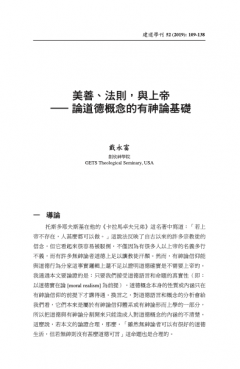美善、法則,與上帝——論道德概念的有神論基礎/戴永富
戴永富
撮要
人無法肯定唯物論又接受道德實在論,因為具有價值的道德判斷不能與唯物現實觀相容。道德實在論意味着道德所包含的評價性概念組(如:美善)和義務性概念組(如:是非)都意味着至上的價值與義務標準的存在。評價性概念的實在性是建基於完美存在的規範性價值傾向,而將義務性概念理解為至高立法者的規範性旨意才能解釋義務性概念的實在性。這種對神性心靈的理論訴求是合理的,因數學和邏輯的實在論解釋需要同樣的論證策略。若數學和邏輯等無法被驗證的抽象事物都以神的思想為其使真因素(truthmaker),說道德這抽象事物也是以神的心靈為其使真因素是合理的。由此,實際存在的不僅是物質,也包括無法驗證的抽象事物,但它們的性質蘊含着完美的心靈的存在。
ABSTRACT
This paper argues for the theoretical superiority of theism in explaining the nature of morality. If materialistic worldview is true, then one can accept both moral realism and materialism, only with the price of explaining morality as a queer entity, which doesn’t fit with the overall pattern of reality. On the other hand, a realist picture of morality, which consists of the evaluative concepts (goodness, excellence, etc.) and its deontic counterparts (oughtness, rightness, etc.), imply the existence of the transcendent standard of values and obligation. More precisely, the realist account of the evaluative concepts of morality require their being grounded in the perfect being’s normative desire, while the deontic concepts of morality can only be satisfyingly accounted for if they express the supreme lawgiver’s binding volition. This appeal to the divine psychology, however, is neither queer nor ad hoc , because a similar argumentative strategy can be made in the realist account of mathematics and logic. If the reality of mathematics, logics, and other empirically unverifiable abstract objects requires postulating the existence of the divine mind as the truthmaker of these objects’ truth claims, then it is reasonable to say that the reality of moral concepts as abstract objects requires postulating the existence of the divine psychology as the truthmaker of moral claims. Hence, a thoroughly realist account of reality also grants actuality to abstract objects, but this implies the existence of the perfect, divine mind.
原載於《建道學刊》52期(2019年7月),頁 109-138。







